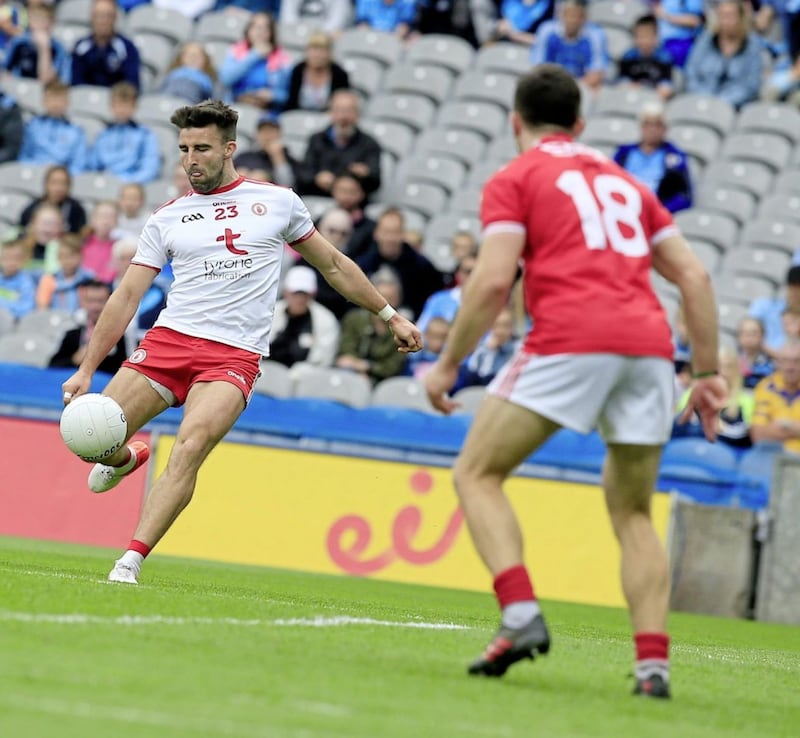To see out the game you need to get there in the first place
T HE chant of Olé! Olé! Olé! Olé! rang out on the on the 18th green at Portrush as Shane Lowry cruised his way to a superb Open Championship victory.
It was a first Major title for a great sportsman and a lovely person that this country should be genuinely proud of. The way he managed his game on the final day was nerveless.
You don’t need to know much about golf to appreciate how he struck a perfect balance between defence and attack. It was not too cagey, but not many risks were taken either.
His performance reminded me of how a seasoned Gaelic football team can close a game out when they have a lead. We hear an awful lot about ‘game management’ these days.
It’s the thing to say if we want to seem like we might know a bit more than the average punter.
But sometimes I wonder if we really understand the full meaning of it.
When I hear pundits or commentators talk about ‘game management’ it nearly always refers to the team leading the game in the second half.
It is about how might they now play a smart possession game, take low-risk options, commit clever fouls, control the tempo, defend deep and counter-attack and so on.
It is about seeing the game out.
But what about the other stages of a game that need to be managed before you might get to that point? How do you manage the game from the start to gain that foothold?
What are your tactical approaches to all the various facets of the game such as kick-outs, defensive shape, where your press starts, and your offensive shape and gameplan.
As Mike Tyson famously said: “Everyone has a plan until they get punched in the face.” What do you do then?
When you find yourself seven points down with your opponent dominating possession it is time to manage the game differently. Allowing the other team to have more of the ball is no longer a rational approach.
After 28 minutes of Saturday evening’s Super 8s match between Tyrone and Cork, the three Cork players with the most possessions had a combined total of 59.
Frank Burns, Conor Meyler and Kieran McGeary were Tyrone’s top three with just 29 between them.
The Red Hands had been a passive shambles as they sat back and watched Cork play possession football.
James Loughrey’s goal was some finish but, with their full defensive shape in place he should never have got a free run.
Michael McKernan had been tagging him in the move but, for some reason, he left the Antrim man to go across and double up on Ruairi Dean.
You can criticise Mickey Harte all you like but, make no mistake about it, this game was won in the dressing room at half-time. Let me put it another way:
If the game continues to the final whistle without the interval, Cork win. It was time for Tyrone to manage the game differently.
THE most obvious thing Harte did was to shake the dressing room up by substituting three players and introducing three quality men in Padraig Hampsey, Richie Donnelly and Michael Cassidy.
After conceding in the first half, Tyrone changed their approach to the Cork kick-out. In doing so, they showed courage by pushing a fourth man into the fullforward line and flooding midfield.
This was a very important tactical change that reaped massive reward.
The kick-out after Cathal McShane’s goal was the first example. Cork actually managed to get it away short but, instead of retreating in numbers, Tyrone put the full press on and hemmed them in.
Niall Sludden then turned the ball over before the brilliant Mattie Donnelly picked up the break and won a free that put just one in it. From the next kick-out they again pressed up and forced Cork to go long.
Richie Donnelly won it cleanly and four hand-passes later Niall Sludden was fouled for the penalty which was brilliantly dispatched by Peter Harte.
McKernan showed great awareness and composure to set McShane up for the first goal, which started from a Niall Morgan kickout give-and-go.
But there was evidently more tempo in the move and clever width.
The attack had four kickpasses and that incisive run to break the line.
The third thing that made a huge difference was pushing Mattie Donnelly into the full-forward line beside McShane.
The Cork sweeper could now only cover either-or, meaning that Tyrone always had a one v one situation inside. Donnelly was immense, hitting three points, winning frees and having a hand in both goals.
The Tyrone players deserve great credit for the character they showed in pulling this game out of the fire.
They also deserve credit for taking on board their half-time instructions and executing a more ballsy gameplan.
But why did it take until half-time before they changed things up?
After 18 minutes Tyrone were seven points down and for the remainder of the half they continued to concede the kick-out, defend deep and allow Cork long spells of possession without engaging them in the tackle.
The challenge for Mickey Harte and his players going forward is to adapt their game quicker.
Can the men on the pitch lead by making the necessary changes during play?
Against better opposition, half-time could be too late to make tactical switches.
The hairdryer treatment might not have the same impact next time around.
To reach another All-Ireland final, Tyrone will need this flexibility to change their game management approach on several occasions during a game. Kerry, Mayo or Donegal won’t miss the same opportunity to close the game out.
Just like that brilliant man from Offaly up in Antrim this weekend. Red Hands will need to adapt better to see off the big guns



